Blessed with good ease of working miracles, St. Spiridon now does not cease to work for the salvation of people’s troubles. More merciful to the humble, rough with the proud saint is characterized by a divine restlessness, makes out and the coffin with the body, journeying toward salvation and the latter sheep from his speaking flock. Holy Father of the First Ecumenical Council, Grand Spiridon not cease strengthen us in faith through his miracles of “yesterday“ and today.
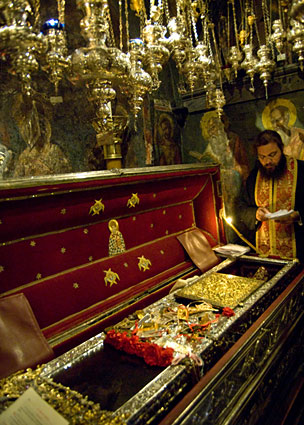
According to “Life” written by Saint Simeon Metaphrastes, Saint Spyridon was born around 270 in Aski, Cyprus, the Emperor Constantine the Great (272-337) and his son Constantius. Characterized him simplicity of manners and humility, his occupation was shepherding sheep. Saint was married and had a daughter, Irina. Sozomen, in his “Ecclesiastical History” (Book II, ch. 11), testifies modesty and holy intransigence. “Although he was married, it was for this reason and deficient in spiritual attainments.” After his wife’s death was enthroned as Bishop of Tremithus, a city which has pastored until 348, when he moved away from being buried in the church “Holy Apostles” from Tremithus. God gave him the grace of healing, continuing his miracles over the centuries, until today.
Currently, the holy relics of Spyridon is a church on the island of Corfu, located 100 meters from the Metropolitan, where there are relics Empress Theodora. Locals honor their patron saint by four annual processions, commemorating the deliverance from famine (1550), an epidemic (1630), plague (1673) and the Turkish siege (1716). These correspond to the events mentioned in processions Saturday, Palm Sunday, the first Sunday in November and August 11th.
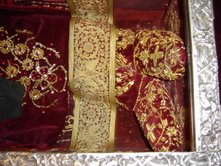 Also known as Saint ‘traveler’, the eve of celebrating its priest Spiridon disappears with the body in the coffin, and when it returns, his body is hot and dusty and shoes, worn and worn, as the grass, and earth on the soles .
Also known as Saint ‘traveler’, the eve of celebrating its priest Spiridon disappears with the body in the coffin, and when it returns, his body is hot and dusty and shoes, worn and worn, as the grass, and earth on the soles .
During religious processions, Saint Spyridon is worn coffin standing, while the faithful sing “Rejoice, you’re with people with body spent; Rejoice, whose body commits today miracles Rejoice serve as proof that your shoes. “
Moral and spiritual portrait of St. Spyridon
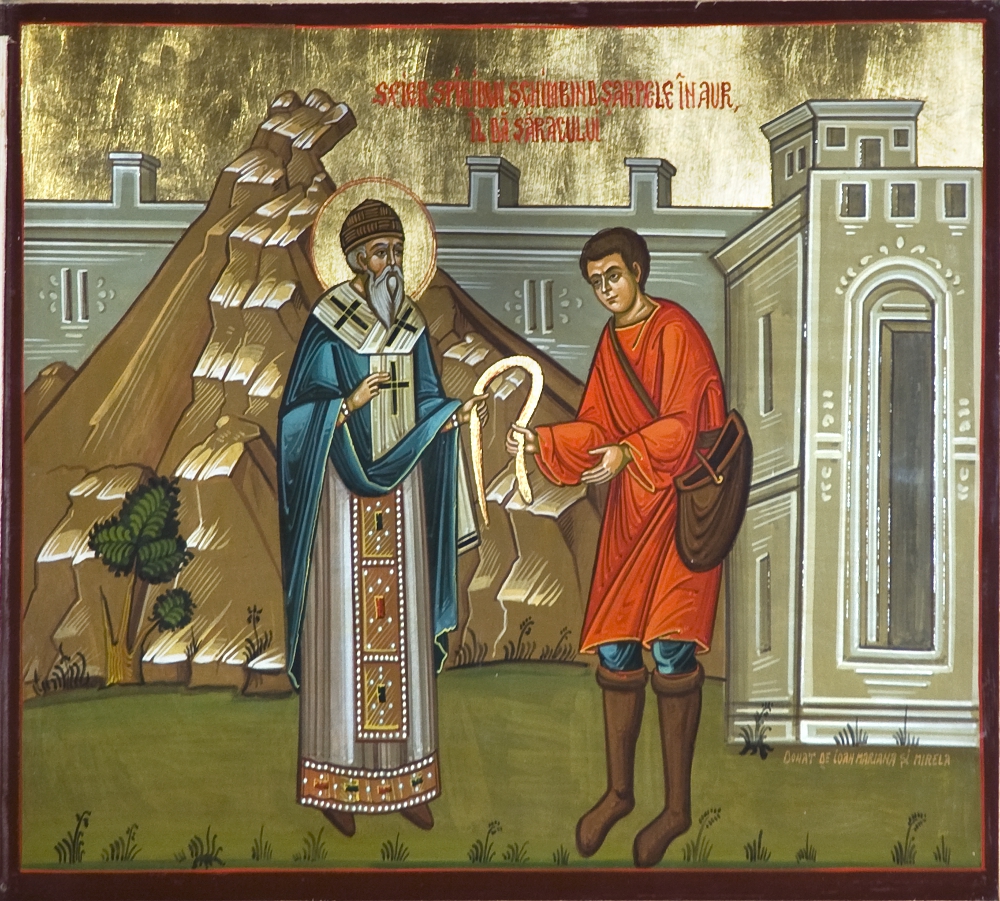 The gift of miracle is linked to moral and spiritual exception of the saint as they arise both from “Life” to and from church hymns. It attributes its unique bears the seal of divine election, as we say a Heirmologion: “Christ has chosen shepherd, preacuvioase, from the womb your gentle, holy and pure, preacher of the holy dogma and vessel preacinstit the gifts of the Spirit.” Also in the “Prayer” Saint Spyridon is portrayed as one who “was chosen in the womb” and “From childhood was full of wisdom” (Ikos 2).
The gift of miracle is linked to moral and spiritual exception of the saint as they arise both from “Life” to and from church hymns. It attributes its unique bears the seal of divine election, as we say a Heirmologion: “Christ has chosen shepherd, preacuvioase, from the womb your gentle, holy and pure, preacher of the holy dogma and vessel preacinstit the gifts of the Spirit.” Also in the “Prayer” Saint Spyridon is portrayed as one who “was chosen in the womb” and “From childhood was full of wisdom” (Ikos 2).
The Saint responds outstanding to his call through a life of deep, intensive and continuous asceticism and prayer. Religious songs effort insists on disciplining the body and soul of its submission: “Îmbărbătându yourself first on passion, soul and body and sanctified you.” Miracles are possible only through soothe passions “îmboldirile your body ordained, God-breathed, dead’re up to your grăirea the life-creating”. Also, “killing fleshly mind and soul eyes before pruning and everything you did with church divine spirit.”
Hymnographer correlates each time, with the acquisition of virtues and charisms nepătimirii. For warns Christ himself: “Many will say to Me in that day, Lord, Lord, in thy name have cast out devils and in thy name wonders have I done? And then will I profess unto them: never have I known you ! Depart from me, ye that work iniquity! ” (Mt. 7: 22-23). Also, Macarius the Great commented that not a few were honored with gifts of healings, prophecies and visions of, but did not step up and perfect love, and fell by pride. “And who reached perfect love has become chained prisoner of grace,” that is, like angels, is adamant to sin, because the Lord has taught freedom.
Holy however, have a life of intense spiritual feeling, as shown in tropar: “The love of Christ is hurt, Reverend mind exalting you are the living light of the Spirit, have acquired attempting the business”, that discernment, knowledge the spiritual by experts. Love for Christ extinguished in him the love after the bodily and material “reverend coals lit up by the Spirit, it burned the matter easy ardent passions, happy.”
Saint reach to the uncreated light as irmos says: “With divine works purifying your soul, (…) you enriched with bright Morning Light of Divine Spirit.” He is completely perfect, being called “sweet-smelling orchard nepătimirii” and “drink of love nedeşertat”. In another Heirmologion says that “enlightening your mind with nepătimirea and embellishing it with divine humility, you received gifts of the Spirit, to banish spirits and dissolve diseases to those who faithfully honor you, Reverend.”
Saint’s humble attitude and wealth of charisms
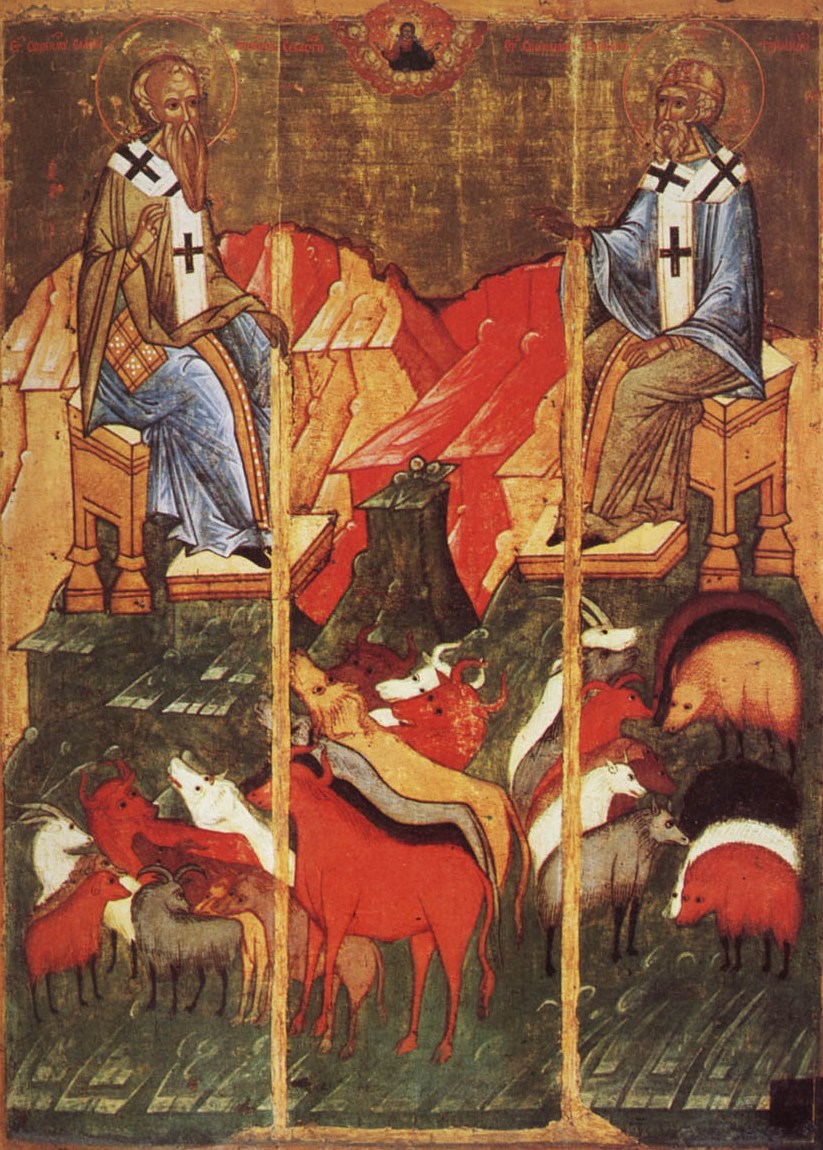
It is edifying to pursue further humble saint attitude towards its wonderful powers. Thus, a woman came to him with her dead child and asking him to rise, Saint ranges and compassion, and fear of not proud, if a miracle. For “fearing vainglory, denying something so wonderful. But, being merciful, be overcome by bitter sorrow of her that crying and asked the deacon his Artemidot” What to do, bro ‘? “. Urged to act merciful, holy raises the child and then his mother, who in the meantime had died of joy to see and the baby alive. A deep humility, “commanded the holy women and those who had happened there, not to tell anyone what they saw and did.”
In another case, a woman was still pregnant with another man than her husband and did not want to admit his sin. St. connects through word can not be born until he confesses his sin. This, however, hardened heart, did not want to testify, dying in great pain in childbirth. Hearing this, the saint is proud of his powers, but “wept and repented for with this kind of punishment has judged her and said:” I will not do justice between people if the word that told me is rather it reaches between juveniles deed ‘. ” And another who wanted to worship him as a god, because he said things that were to happen, he says: “I am passionate like you, and if you see that I know what is working away, it gives me my God, in whom and you, you begin to believe, you know that is the mighty strength and power. “
Spyridon transpires humility and modest in her clothes. That happened when he was called by Emperor Constantius to heal. “Holy bishop dressed in simple clothes and wore hand a rod of palm and miter on his head, as tiny bowl clay hanging to his chest, as was the custom of those who lived in the Holy City of Jerusalem, where they used to carry oil from Holy Cross “. One of the servants of the king, seeing him dressed like this shabby, does not recognize him and not give him permission to enter the palace even hits him in the face. But St. Spiridon “is harmless, as the Lord and turned to the other side. That, knowing him to be bishop and seeing his fault, and apologized humbly, he and got it.” Therefore Hymnologist and calls himself “bishop without malice” and “kind Teacher shepherd.”
Once his body heals king saint seek to heal the soul as sticheron sing: “With your teachings you ever gone to seek to honor all the priests, as servants of God forever.” “Honoring” the song refers to the exemption from taxes of the whole clergy and church servants, a decision that takes the king on the advice of the saint, “judged to be so impious, as servants of his kingdom without death, to give tribute to the king of mortal “.
Healing him the king is obliged to accept gold as Rapla, but St. divides the poor: “The speeches divine commandments guarding them fully all happy, pain the high king of them are dispersed and gold have given everyone on earth, happy Spyridon. that you have not won anything on earth and in heaven shaking enduring wealth. ” Holy victory on the passion for money is reflected in the miracle of a snake’s turning into gold for helping someone in great need materials, for ‘habit of trampling silver love and mercy on the needy. “
The gentleness and the harshness of the Saint
 Songs call “Spiridon wise, meek and simple, the whole and without malice”. Many sings the beauty of moral character and quiet “easily forgiving” the saint “in the land of gentle reaching, father, a gentle and gracious and clean making you”; “Without malice, just, merciful and patient, loving welcoming of foreigners, most holy bishop and godly wisdom adorned”.
Songs call “Spiridon wise, meek and simple, the whole and without malice”. Many sings the beauty of moral character and quiet “easily forgiving” the saint “in the land of gentle reaching, father, a gentle and gracious and clean making you”; “Without malice, just, merciful and patient, loving welcoming of foreigners, most holy bishop and godly wisdom adorned”.
Exapostilarion also portrays him as “the most gentle and peaceful, merciful and loving the poor” being ourselves encouraged “to follow his gentleness, kindness, love of people and his great wisdom.” St. Simeon Metaphrastes he wrote the saint “Humanism honor and pleasure of God by following David’s gentleness, simplicity Jacob in Abraham’s heart and love of strangers.”
Compassion, and his humor are illustrated by a story about a gang of thieves who tried to steal his sheep. Morning, St. slung finds unseen. Gracious, making prayer for them, that God will unravel and departure gives them a ram, amused, that should not have been in vain “vigil” of the night. His act is genuine spirit evangelical, not just an episode anecdotally after the word Savior invites us to return evil for generosity disarming: “He who desires to sue you and take your coat, give him your cloak” (Mt. 5, 40).
However, the saint is intransigent with the proud, as shown in the miracle that “silencing once healed a deacon.” Going Grand Spiridon in a village Eritrea, he entered the church, a deacon asking him to make a short prayer, because he was weary of road length and heat. But Deacon long prayer intentionally, because pride in his voice and loved to listen to singing. Holy, “although it was good temper, reviled him harshly, saying:” Shut up! “. And immediately he was bound language that not only voice, but also about lost and stand mute as one without language” . Following pleas relatives and friends that deacon, St. barely persuaded his voice playback. But left him with some difficulties in word, to not be proud of his melodious voice and clear voice. For “saint was harshly with the proud and magnificent desert”.The deacon was proud to hear his own voice, but the Great Spiridon humbled listening to the angelic voices. “When you sang holy prayers, angels had served with you,” says troparion of the saint. Thus, being at a Vespers holy bishop only servants of the church, it was the people in the church to give answers appropriate, but could hear the high voice sweet and unearthly shouting “And your spirit ‘and’ Lord have mercy ‘, every litany uttered by a deacon. That voice shone to those who were far from the church, drawing them to approach and to sweeten the ears and hearts. But “after they entered the church, they saw no one but the bishop with few ministers church, then the church singing could be heard not by anyone wondered very much.”
The intransigence of the saint, called me “rule, the high priesthood” is evidenced by his conduct toward Bishop Antim that, taking a sermon in church, quoting the verse: “Arise, take up thy bed and walk” (Mark 2, 9) by substituting the word “bed” (krábbatos) by “bed” (skímpous), that: “Arise and take your your couch.” Hearing this, Saint Spyridon, who was present, stands up and he says to Antim “Did You’re better than who said” bed “ashamed of his words?”. Admonishing him so out of church saint in front of everyone, “the Antim that haughty beauty of his speech, shameless” to teach him humility and meekness spiritual wisdom.
Another time, when the same Antim daydreaming to vineyards and a village, the Grand Spiridon, knowing the thoughts of his heart, urges him to gather rather incorruptible riches in heaven.
Confirmation of faith through miracles, at the First Ecumenical Council
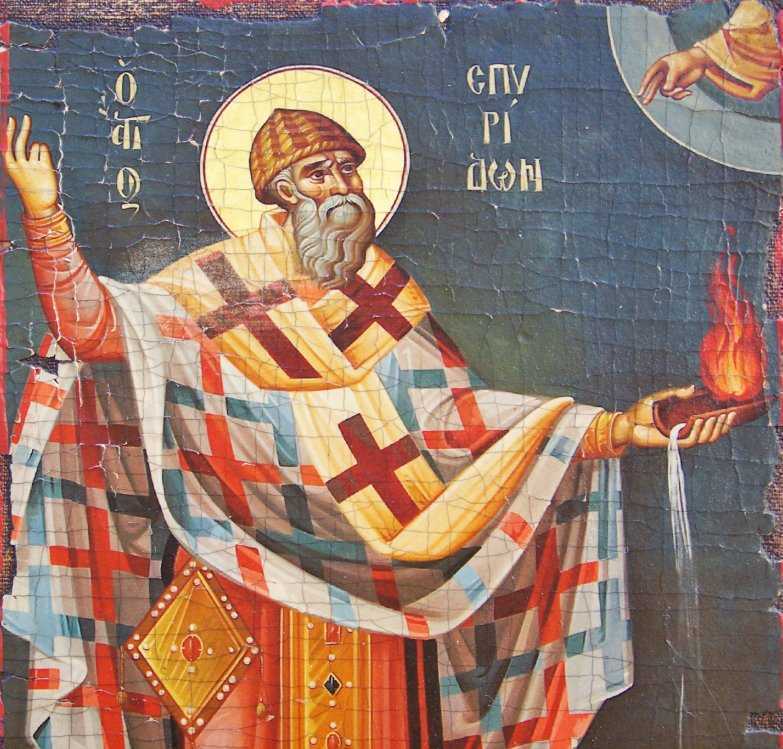 Climbing “the mountain without passions” the saint enter into “the cloud of deep reflections of the divine”, receiving the “slab “heart” law redeeming “the former Great Paul, who said he received the law” not on tablets of stone but on fleshy tables of the heart “(II Cor. 3: 3). Saint Spyridon was a simple man, not literate, which, amazingly, knew the Scriptures thoroughly, however, that later Pious Mary of Egypt, who knew by heart the whole Psalter, though never had read. Grand Spiridon and other saints as it celebrates St. John Chrysostom word after the “grace of the Holy Spirit takes the place of the Scriptures” into those of pure life. The righteous, God speaks face to face. Only after people have fallen in heavy sins “was needed writings, backgammon, written scrapbook of all the deeds and words of God.” And Christ Himself gave some written apostles, “but instead of writing has promised to give them the grace of the Spirit, saying,” He will remind you of all “(John 14, 26)” ( “Homilies on Matthew “Homily I).
Climbing “the mountain without passions” the saint enter into “the cloud of deep reflections of the divine”, receiving the “slab “heart” law redeeming “the former Great Paul, who said he received the law” not on tablets of stone but on fleshy tables of the heart “(II Cor. 3: 3). Saint Spyridon was a simple man, not literate, which, amazingly, knew the Scriptures thoroughly, however, that later Pious Mary of Egypt, who knew by heart the whole Psalter, though never had read. Grand Spiridon and other saints as it celebrates St. John Chrysostom word after the “grace of the Holy Spirit takes the place of the Scriptures” into those of pure life. The righteous, God speaks face to face. Only after people have fallen in heavy sins “was needed writings, backgammon, written scrapbook of all the deeds and words of God.” And Christ Himself gave some written apostles, “but instead of writing has promised to give them the grace of the Spirit, saying,” He will remind you of all “(John 14, 26)” ( “Homilies on Matthew “Homily I).
Thus, St. Spiridon get to know God through his life, as he confesses and icos: “Known you with that we walk your God, Who sees the hidden and soul recess receiving Trinity making it on this with sincerity you got it”. Knowing by experience divine truth of faith, the Grand Spiridon is called “the pillar and protector of the faith,” as it looks and miracles First Ecumenical Council of Nicaea (325).
At the synod, the peripateciens Greek philosophers were present, among which highlight the one that formula sophistic arguments in favor of the Arian heresy, after which Jesus Christ was only a creature of the heavenly Father. Saint Spyridon, who was also part of the 318 Holy Fathers, persuaded the philosopher will come to know the truth not by human wisdom but with God’s power.
Holy perform a miracle with a brick, wanting to show consubstantiality persons of the Trinity, because he knew that the doubters’ eyes are more faithful than the ears “. Making the sign of the Cross, the name of the Father and of the Son and of the Holy Spirit, Grand Spiridon closely in hand brick and “! Too glorious miracle! Fire rose into the air, water spilled on earth and clay remained in the hands of the saint “. Those present were afraid, “philosopher evil ashamed” sing a sticheron. This disease is cured by the Arian heresy, embracing the true faith.
In this way it shows that Saint Spyridon closely follows the teaching of St. Paul, who, although he was a learned, not taught by wisdom rational, but by “demonstration of the Spirit and of power, that your faith may not be in the wisdom of men but in power of God “(I Cor. 2: 5-6).
Constantin Ghiță – Ziarul Lumina
